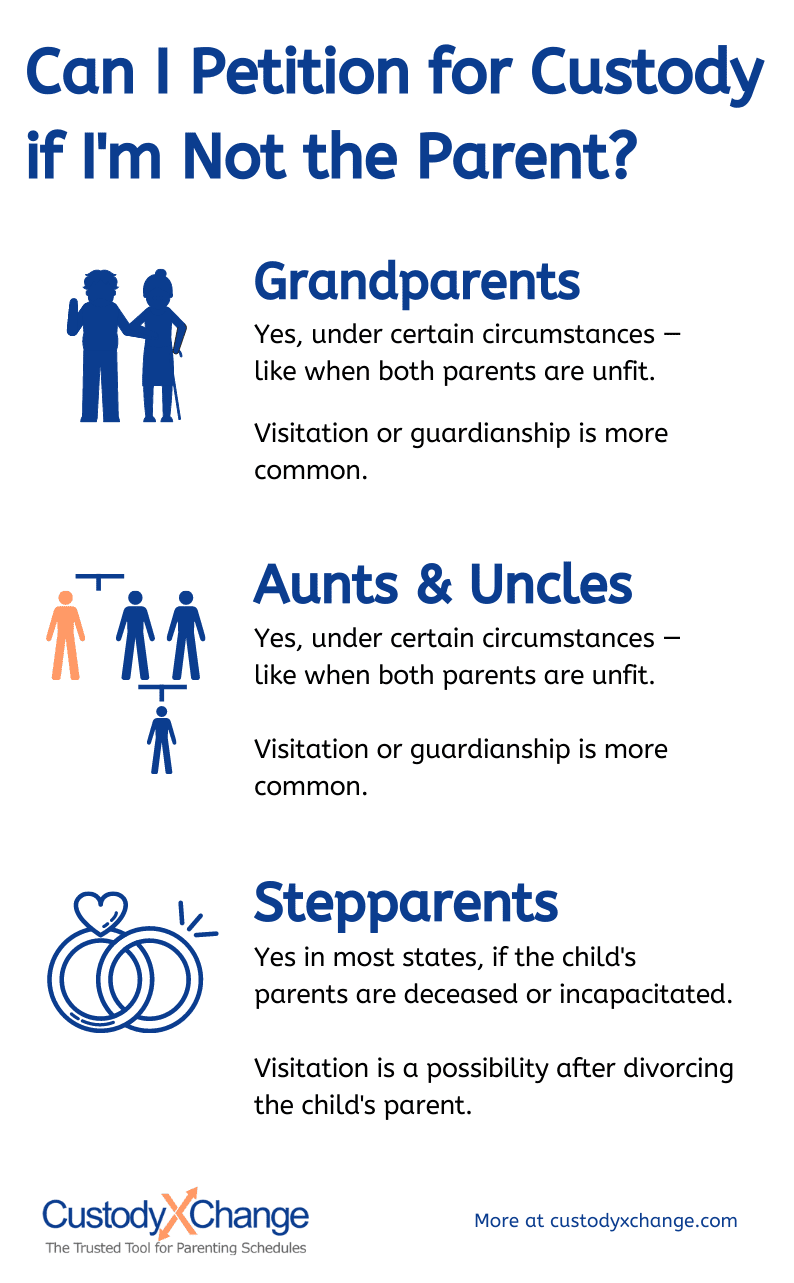Aunts' and Uncles' Rights | Child Custody and Visitation
A child's relationships with extended family members can be just as important as their relationships with their parents. Some relatives, like aunts and uncles, even become parental figures.
If you suddenly aren't allowed to see your niece or nephew, you may wonder if you can get visitation rights. You might even consider petitioning for custody of your niece or nephew if you believe the child's living situation is detrimental to their well-being.
A third option is pursuing legal guardianship of your niece or nephew, which is a little different than custody.
Very few states have laws specifically related to aunts or uncles.
Learn how you can gain legal rights to custody, guardianship or visitation as an aunt or uncle.

Aunts and uncles: Child custody rights
Whether aunts and uncles have the right to petition for custody varies by state. For example, Georgia allows siblings, grandparents, great-grandparents, aunts, uncles, great-aunts and great-uncles to petition for permanent custody of a child. Check your state's family law statutes.
It can be quite difficult for nonparents to get custody. The court presumes that awarding custody to the child's parents is in the child's best interest. However, aunts and uncles might be able to get custodial rights of their niece or nephew if:
- The parents are unfit.
- There's a termination of parental rights case.
- The child has been abandoned.
It is up to the aunt or uncle to prove to the court that awarding them custody would best for the child and that allowing the parents to have custody would harm the child's well-being.
Aunts, uncles and grandparents have priority for custody when a child is removed from a parent's home. If multiple relatives want custody, whomever is most fit to care for them receives it. Sometimes, an aunt or uncle adopts the child if the birth parents want to put the child up for adoption.
Aunts and uncles: Legal guardianship
Legal guardianship is more common for aunts and uncles than custody. Legal guardians can make decisions on the child's behalf and must tend to the child's daily care. Parents maintain custody unless they voluntarily give up their parental rights.
The relative can ask the court to grant guardianship, or a parent can sign paperwork to name them as the temporary or permanent legal guardian.
Temporary guardianship is common when a parent is in a precarious situation. This would put the child in the care of their aunt or uncle during the parent's absence or in case of their death. This is common for:
- Soldiers on deployment
- Firefighters actively fighting an ongoing forest fire
- Someone who's about to begin a prison sentence
- Someone who's terminally ill
When a parent is in danger of losing their parental rights, they may give permanent guardianship to a family member so the child won't go up for adoption.
Aunts and uncles: Visitation rights
Visitation cases tend to be more straightforward than custody cases. Many states have laws regarding third-party visitation.
For an aunt or uncle to get visitation rights, they must prove denying visits would be harmful to the child. This usually requires testimony from an expert witness like a child psychologist.
In some locations, extended family members have the right to visitation even if parents object (as long as the parents are separated) or a if a stepparent has adopted the child.
It's most common for parents and extended family members to figure out a visitation arrangement without court intervention. A common way to spend more time with your niece or nephew is to babysit them while their parents are unavailable to watch them.
Preparing for court as an aunt or uncle
When you're an aunt or uncle fighting for visitation or full custody, preparation is key. Custody X Change can help.
To set up the perfect custody and visitation schedule, click on the "calendar" tab. You can also enter the schedule you currently follow.

You can customize this to fit your situation with Custody X Change.
Above the calendar, you'll see your percentage of caretaking time. The printable report could prove you have been your niece or nephew's primary caregiver, boosting your case.

You can customize this to fit your situation with Custody X Change.
Clicking on the "parenting plan" tab allows you to design a parenting plan you can give the court to show you're prepared for custody.

You can customize this to fit your situation with Custody X Change.
Your young relatives need you in their lives. Use Custody X Change to get more time with them.
